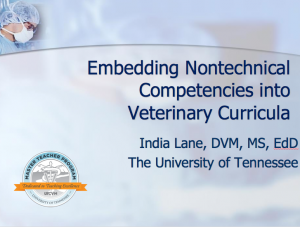 On Friday, Jan. 29, Dr. India Lane, Professor of Medicine in the Department of Small Animal Clinical Sciences and Associate Vice President for Academic Affairs and Student Success at the University of Tennessee, visited with faculty to discuss methods of teaching non-technical skills across a veterinary education curriculum.
On Friday, Jan. 29, Dr. India Lane, Professor of Medicine in the Department of Small Animal Clinical Sciences and Associate Vice President for Academic Affairs and Student Success at the University of Tennessee, visited with faculty to discuss methods of teaching non-technical skills across a veterinary education curriculum.
According to Dr. Lane, the following non-technical competencies have been identified as critical to successful veterinarians.
- Interpersonal skills. Characterized by building relationships and trust with others by demonstrating interest in their concerns, valuing their perspectives and treating them with respect.
- Self-Management. Exhibited by acting autonomously and confidently in decision-making and working independently.
- Motivation and Persistence. Characterized by a drive for results with focused goals, persistence and in the face of multiple tasks.
- Ethics and Moral Integrity. Demonstrated by integrity, consistent with the principles of the profession and one’s own convictions.
- Self-development and lifelong learning. Demonstrated by continuing development of one’s own skills and knowledge base in order to meet changing needs or challenges.
- Flexibility. Demonstrated by adaptability and resilience, by staying optimistic and by using a range of skills to handle challenges.
- Communication skills. Exhibited by communicating effectively in written and spoken methods, including listening to others effectively and making effective formal presentations.
- Leadership skills. Demonstrated by motivating others, including energizing, mobilizing and empowering others to achieve important goals.
- Coaching skills. Characterized by coaching and developing others, building skills, addressing their needs and providing effective feedback.
- Business skills. Demonstrated through business orientation and understanding of resource management in meeting organizational goals.
- Critical thinking. Exhibited in sound judgment, making decisions on the basis of logic, evidence, experience and accepted practice, and seeking information when needed.
- Creativity. Demonstrated by thinking innovatively to create or try new approaches to challenges.
- Cultural competence. Demonstrated by awareness of cultural sensitivity and cultural competency in public and private practice communications and settings.
- Crisis/Incident management. Exhibited in knowledge and ability to apply principles of crisis management relevant to veterinary and public health practice.
Dr. Lane’s presentation confirmed the importance of addressing these professional skills and offered methods for doing so that included application-based learning exercises in media relations, simulated job interviews, practice/business management, case presentations, and call-the-client scenarios, among others. She also provided examples of assignments that build student self-awareness and suggestions for implementing reflective learning journals and portfolios.
To review Dr. Lane’s presentation and tips for teaching, visit: https://mediasite.osu.edu/Mediasite/Play/7235b38accbd490d8e4280e4bbd89d5f1d.